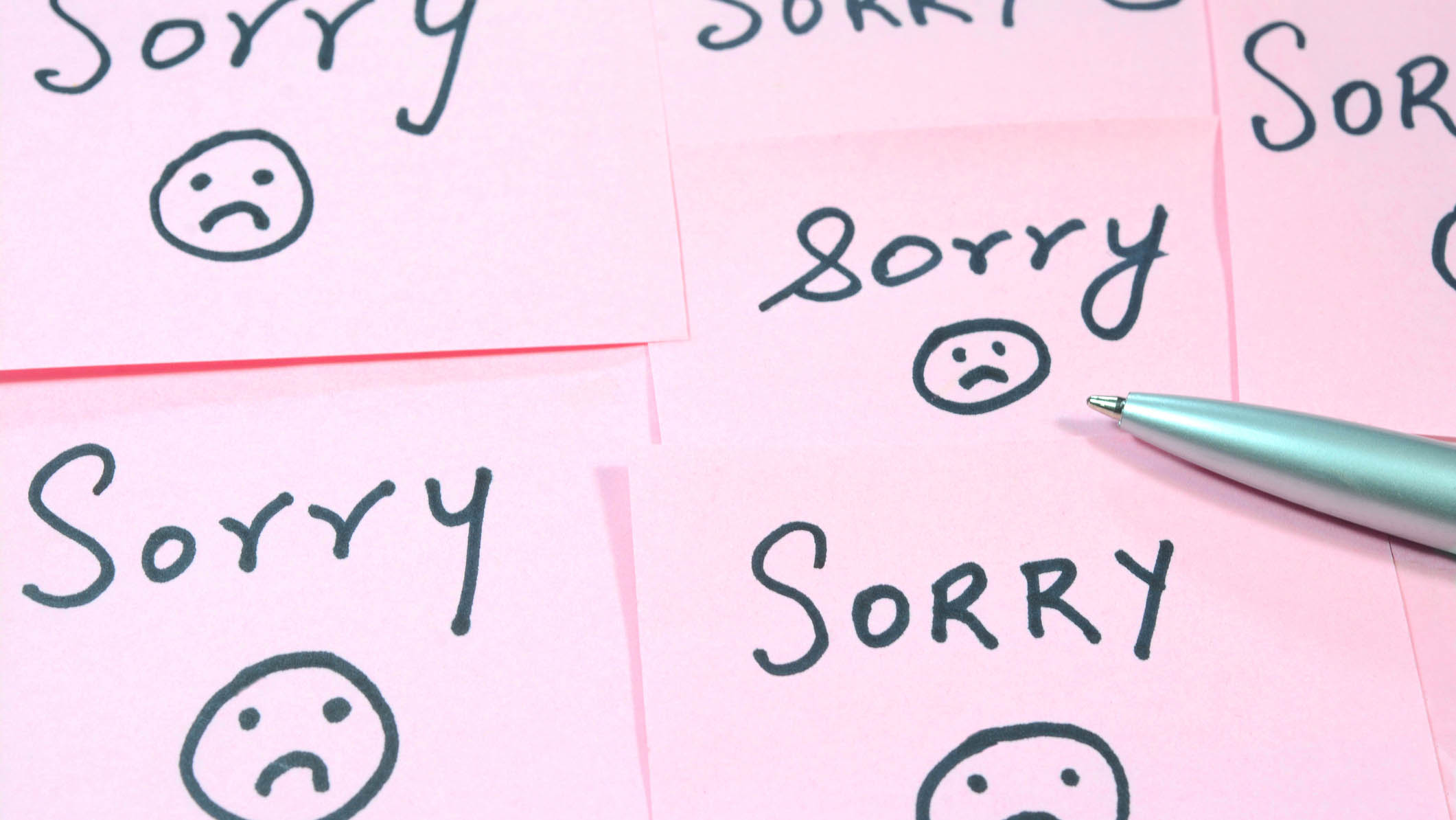How to spot a fake apology: 31 non-apologies to look out for
This is what people really mean when they say 'sorry'

It really is a fertile time for the apology. The combination of a whole load of people finally getting exposed for their past wrongdoing and being forced to confront their crimes, and social media’s ability to enable anyone, anywhere to take offence at absolutely anything, has meant that we’ve witnessed a never-ending stream of apologies over the past few years for things ranging from the insignificant to the really-quite-significant-and-actually-very-bad-indeed.
In the old days, of course, quite often people would simply ignore the outrage, or flatly refuse to admit anything. Now though, with people keen to maintain their image - and the fact that, in the age of digital photography and communications (and screenshots) it’s not so easy to dismiss the clear, clear evidence against you - the quickly-issued mea culpa is the primary method of dealing with any accurate claims of wrongdoing. Swallow your pride, issue the apology and let the news cycle move onto someone else.
However, an ever-growing trend is the use of the ‘non-apology’ apology. Popular amongst the stubborn and ego-driven who, deep down, don’t really believe they’ve done anything wrong - even when they definitely have - it’s a consequence of being so petty that, even when bang to rights, you still can’t bring yourself to simply say: ‘I’m sorry’.
This is how to spot a fake apology - and we've translated just what those non-apologies actually mean for you...
(Main image: Getty Images)

1. “I’m sorry to anyone who was offended”
Translation: I’m sorry that you took offence at this. That does not mean it was offensive though, just that you must be easily offended. So, really, it’s your fault.
Get exclusive shortlists, celebrity interviews and the best deals on the products you care about, straight to your inbox.
2. “I’m sorry that you feel that way”
Translation: I’m sorry that you feel upset at this thing that I’ve done. But lots of people aren’t upset, which means that it’s your problem. So, really, it’s your fault.
3. “I apologise if I offended anyone”
Translation: ‘If’ I offended anyone. So there’s a chance, a huge chance if I do say so myself - and I do - that no one was actually offended. So, if you are, that’s really your fault.
4. “Mistakes were made”
Translation: Not by me, though.
5. “I’m sorry if any words of mine have been taken out of context”
Translation: There is no context that can possibly excuse what I just said but I know you probably won’t bother to look up all of what I said so you just might give me the benefit of the doubt. And then I won’t have to apologise, because I really hate apologising because I believe everything I do is right.
6. “I’m sorry if any words of mine have been misconstrued”
Translation: It’s your fault for taking my words the wrong way. I mean, obviously how you’ve construed them is exactly how I meant them, but if you’d taken them another way - not the way I meant them which was definitely the way you’ve taken them but, hey it’s still a possibility that you could have taken them another way - you wouldn’t have been offended by them. So, really, it’s your fault.
7. “Sorry if you didn’t get the joke”
Translation: It’s your fault you’re not clever enough to not be offended, even though what I said wasn’t funny and wasn’t a joke.
8. “I would never say this now”
Translation: Because I’ve now learned that, even though I meant it at the time, and still mean it now, apparently other people don’t like it. Which is your fault.
9. “This is not who I am today”
Translation:Who I am today is a toad trying to get off the hook without apologising.
10. “I’m only human”
Translation: So, because we all make mistakes, really, none of us are responsible for any of those mistakes. Even this mistake which I made which is considerably worse than any mistake you’ve ever made and which I don’t really regret, I’m just having to say I regret it. This is all your fault for making me do this.
11. “I deeply regret”
Translation: I deeply regret that I’m having to apologise for what I did. And I’m not even doing that.
12. “I’ve learned from this”
Translation: I’ve learned that I need to not get caught.
13. “I think a lot of people misunderstood that statement, and for that I apologise”
Translation: It’s your fault.
14. “It is unfortunate I was not more careful and deliberate”
Translation: It is unfortunate that I got caught.
15. “Nobody is sorrier than me that this event occurred”
Translation: I actually mean this, because I am really sorry that I am being forced to issue this apology, which isn’t actually an apology.
16. “It was not my intention to offend”
Translation I did though, because I didn’t bother to think through how my actions or words would affect anyone else. But, really, it’s your fault for getting offended, you didn’t have to get offended, you could have let it go because, really, think about how talented I am and if I lose my job then you’re the ones who’ll suffer really.
17. “I’m sorry for how the issue has affected the company”
Translation: I’m not sorry for how it’s affected you but I am definitely sorry that my shares will now be worth less.
18. “I am devastated by and apologetic about what the company has come to represent”
Translation: Isn’t the company awful? Nothing to do with me though, even though it is entirely to do with my actions.
19. “I have received nothing but notes of appreciation and support from people within the organisation”
Translation: Yes, they work for me so they have to say that, but they’re all telling me what I did was fine, so you’re the one in the wrong. So, really, it’s your fault.
20. “I’m sorry to all of my fans for letting them down”
Translation: I am sorry that I will now have fewer fans, sell fewer tickets and make less money. I’m not sorry to the person who was affected by what I did though.
21. “My choice of words was not the best”
Translation: Not the worst though right?
22. “I have three daughters and I was brought up by a wonderful mother”
Translation: I am trying to suggest that by knowing a woman I can’t possibly do anything bad to a woman. Even though I have. Because I’m not sorry. Because it’s your fault.
23. “It was a clumsy attempt at humour which failed”
Translation: This is your fault for not getting the joke. Probably because you’re not smart enough. Which is your fault.
24. “At the very least, I am happy that [my actions] started a conversation”
Translation: Really, I’ve done you all a massive favour. So, overall, this is net positive so there’s nothing to apologise for is there.
25. “I don’t remember this happening, but if it did I apologise”
Translation: I’m just going to subtly suggest that the other person could be making this all up. I mean, they’re not, but they could be. Which means it might not have happened. Even though it did.
26. “This was inappropriate drunken behaviour”
Translation: It’s the demon booze’s fault, not mine. I mean, I drunk the booze and because I’ve drunk booze before I know exactly how it affects me, but it’s still not my fault. Which probably means it’s yours.
27. “I owe him the sincerest apology for what would have been deeply inappropriate behaviour”
Translation: ‘What would have been’. Not ‘what was’. ‘What would have been’. If it had happened. Which it did, but I’m not going to admit that am I? That would mean having to apologise, and I’m not going to do that.
28. “I have never willfully or intentionally harmed anyone”
Translation: Nobody died did they? What’s the problem? And I didn’t mean it, so it doesn’t count. So, really, I should not be having to apologise here. You should all be apologising to me.
29. “I fully recognise that I have tested certain boundaries, which I am working hard to correct”
Translation: You set those boundaries, not me. So if I crossed them, really that’s your fault for not setting them back a bit further.
30. “I wanted to acknowledge fault where such acknowledgment is appropriate”
Translation: Such acknowledgment, on this occasion, according to me, is not appropriate.
31. “I’m sorry, but”
Translation: I’m not sorry.
(This article has been amended and updated since its original publication date)